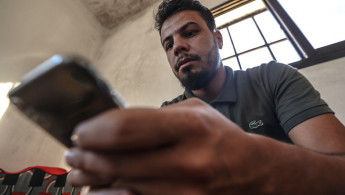Syrian regime arrests citizens under new cybercrime law
The Syrian regime arrested 11 people on Wednesday for spreading "fake news" on social media under a new cybercrime law adopted last month.
The Syrian Ministry of Interior announced that the individuals were arrested in Aleppo after they admitted to "communicating" with social media pages being run from "outside the country." The ministry also warned citizens not to be deceived by false "rumours" spread by certain websites.
The arrests came after the passage of a new cybercrime law on 18 May, as reported by local outlet Enab Baladi.
The law imposes penalties for "information crimes" on the internet, including slander, immodesty and crimes that infringe on Syria's constitution. An earlier leaked version of the law included fines and up to five years in prison for "undermining the prestige of the state."
Internet service providers must also preserve a copy of all users' data that can be handed over to the Syrian authorities upon request. According to rights monitor Access Now, such a move is "extremely dangerous, especially in a context where there is no … due process."
Anyone who administers a website or publishes content that "goes against the constitution" can be jailed for up to 15 years and receive a fine of up to 15 million Syrian pounds (US$3,760).
The law "poses a threat to the already deficient and almost non-existent freedom of expression in Syria," said Syrians for Truth and Justice (STJ), a civil society organisation.
"The government is sending a direct and clear message to citizens that courts shall prosecute any person who would dare to express a non-standard opinion," STJ added.
Though Syria's constitution guarantees freedom of speech, authorities heavily punish dissent in practice.
Syrians who protested in the 2011 revolution often ended up in prison, where they joined an estimated 132,000 Syrians who also endured torture at the hands of regime security services.
In one instance, a Syrian regime soldier was forcefully disappeared after proposing online to Syrian president Bashar al-Assad's daughter.
Syria previously passed a cybercrime law in 2018, sparking criticism from rights monitors.
Digital activism was an important tool for Syrian activists during the revolution, allowing them to organise and send footage of human rights violations to media outside of the country.
Activists have said that digital surveillance was common since at least 2011 and that phones were regularly searched at regime checkpoints for evidence of political activism.
Syria has been undergoing a civil war for the last 11 years, sparked by a 2011 revolution and a bloody crackdown by the regime that killed upwards of 300,000 people.
The country is currently divided between regime forces, Turkish-backed opposition forces and the US-backed Kurdish Syrian Democratic Forces.





 Follow the Middle East's top stories in English at The New Arab on Google News
Follow the Middle East's top stories in English at The New Arab on Google News


